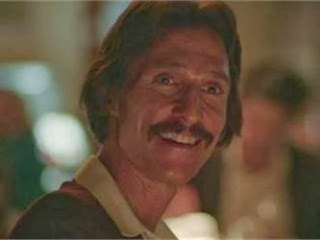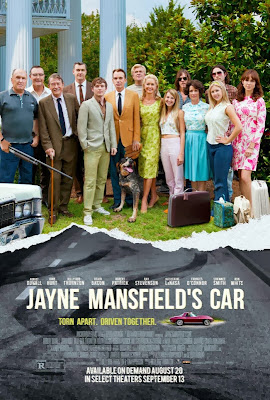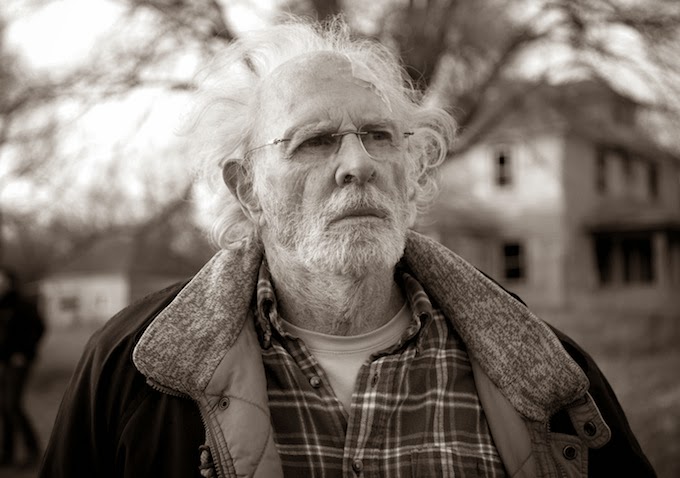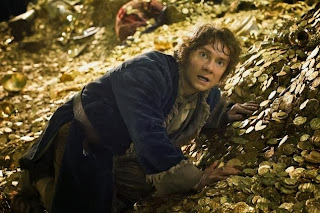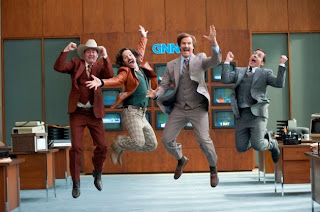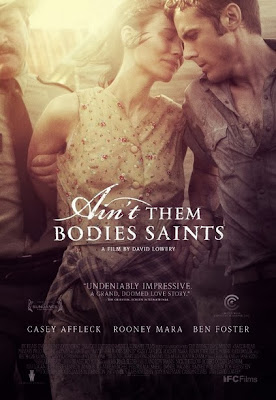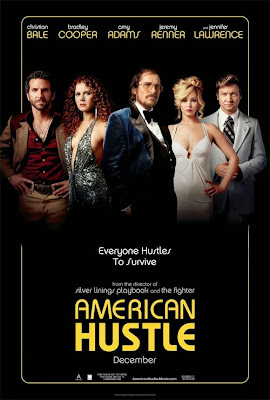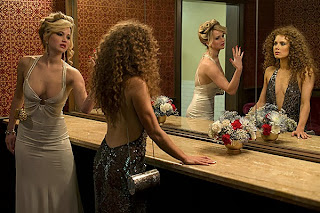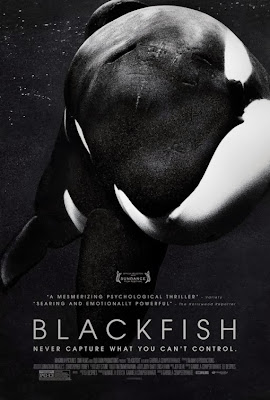VIOLET & DAISY
(US - 2013)
The directing debut of Oscar-winning PRECIOUS screenwriter Geoffrey Fletcher, VIOLET & DAISY is an oddity that starts as an almost chick-flick version of THE BOONDOCK SAINTS before becoming a stagy character study. It's a little too "cute" at times, only very rarely crossing the line into "quirky." It could almost be a play, and it definitely feels like the kind of movie made by a screenwriter stepping behind the camera for the first time. Violet (Alexis Bledel) and Daisy (Saoirse Ronan) are two teenaged assassins about to start a much-deserved vacation when they get a call about a quick-money hit from their handler Russ (Danny Trejo): rub out a guy who stole some money from their boss. Wanting some time off but needing some extra money to buy matching dresses from the trendy clothing line of teen pop sensation Barbie Sunday (Cody Horn), Violet and Daisy take the assignment. Arriving at the target's apartment only to find he's out, they wait for him but fall asleep on his couch. When the schlubby target (James Gandolfini) arrives home, he covers them with a blanket and gives them cookies and milk when they wake up. The girls unexpectedly bond with the target, who turns out to be a nice guy who's had some shitty luck, and find it difficult to pull the trigger, causing them to re-examine their own friendship and working partnership while the boss sends his top assassin (Marianne Jean-Baptiste) to trail them in case they can't complete the job.
VIOLET & DAISY doesn't always work, and it belongs to that KILLING THEM SOFTLY and THE AMERICAN school of denying audiences the kind of payoff that the set-up seems to ensure (I imagine this would've gotten an "F" from the insipid CinemaScore had it opened wide), but it has its moments amid the inconsistencies. Ronan and Bledel are quite good, and they get a great intro dressed as nuns, mowing down a roomful of mobsters to the tune of Merrilee Rush's version of "Angel of the Morning." Other odd touches include the pair being prone to hopscotch and lollipops, riding a large tricycle to a job, and Daisy playing patty-cake with Russ while talking over their assignment. The joke, of course, is that they're basically little girls in a cold, violent profession, though Violet--played by a well-cast Bledel, who's about a decade older than she looks--hides that she's a bit more hard-edged and worldly and tries to shield that from the naïve and childlike Daisy; Violet is almost like a few-years-older version of Natalie Portman's Matilda from Luc Besson's THE PROFESSIONAL. At times, there's a bit of a SUCKER PUNCH thing going on here as well, though VIOLET & DAISY was shot in 2010, well before that film's release. It's also worth a look for the always-excellent work of the late and already much-missed Gandolfini, who died two weeks after the film's belated, 17-screen theatrical release in June 2013. At just 88 minutes, the film feels a bit hacked down (a pre-OFFICE and MAGIC MIKE Horn is in the credits but is only seen on a magazine cover and a billboard) and hits and misses in equal measure, but the fine performances of the leads make it an interesting curiosity, as does Gandolfini's brief reunion with his SOPRANOS co-star John Ventimiglia. (R, 88 mins)
DEAD IN TOMBSTONE
(US - 2013)
With films like DEATH RACE 2, DEATH RACE 3: INFERNO, THE MARINE 2, and THE SCORPION KING 3 to his credit, Dutch director Roel Reine is usually mentioned along with Isaac Florentine and John Hyams as a top name in the world of straight-to-DVD. The surprisingly entertaining DEATH RACE 3, in particular, demonstrated that Reine--who frequently functions as his own cinematographer and camera operator--was adept at making low-budget action films look like big-screen contenders. The idea of Reine helming a supernatural western is full of potential, but DEAD IN TOMBSTONE is a disappointment, primarily because he falls into the trap of shaky-cam action sequences that reduce everything to jittery, headache-inducing incoherence. Reine's camera never stops moving and swirling, and he also gets a little too distracted with directorial wankery, usually in the form of bizarre POV shots that bring to mind what a spaghetti western might look like if Sergio Leone had access to a Skycam.
The outlaw Blackwater Gang, led by Guerrero de la Cruz (Danny Trejo) and his half-brother Red Cavanaugh (Anthony Michael Hall), arrives in the small mining town of Edendale to steal some gold from a bank vault. They successfully steal the gold, but the psychotic Red kills the sheriff (Daniel Lapaine) and goads the rest of the gang into killing Guerrero. Trapped in a Purgatory that looks like a leftover SILENT HILL set, Guerrero makes a deal with the Devil--who appears in the form of a philosophical blacksmith (Mickey Rourke)--to save his soul in exchange for the six remaining members of the Blackwater Gang. A year later, Guerrero pulls a HIGH PLAINS DRIFTER and shows up in Edendale--now taken over by the power-mad Red and renamed Tombstone--to exact his revenge. There's no reason that this shouldn't be a fun B-movie, but Reine can't restrain himself and just shoot a sequence in a straightforward fashion. He wants to go for a classic Sam Raimi feel with a contemporary, video-game aesthetic--Reine's a talented genre director but he's not Raimi and the results are simply eye-glazingly dull. If he'd just buckled down and made a normal-looking western, he might've had a minor cult movie on his hands instead of the forgettable DTV throwaway it turned out to be. Trejo is perfectly cast, Hall has some fun playing a dastardly villain, and Dina Meyer is good as the sheriff's vengeance-obsessed widow. Rourke, presumably here because he torched the last remaining bridge built after his short-lived WRESTLER renaissance by walking off of SEVEN PSYCHOPATHS and trash-talking its director, Martin McDonagh (Woody Harrelson replaced him), looks even worse here than he did in JAVA HEAT. Reine directed the 2008 Steven Seagal dud PISTOL WHIPPED and seems to employ some classic Seagal tactics here as he has a bloated Rourke a) wearing a big duster in a hapless attempt to conceal his gut, and b) dubbed by someone else in most of his scenes. There seems to be no rhyme or reason as to why Rourke--who has a distinct sound--has an obviously different voice on and off throughout. Perhaps a plot point was changed and this was the best they could do rather than deal with him coming back to record some new dialogue? DEAD IN TOMBSTONE makes impressive use of some unlikely locations in Romania, utilizing some still-standing COLD MOUNTAIN sets that have been seen in several westerns since (the History Channel miniseries HATFIELDS & MCCOYS was also shot in Romania), but when it's all said and done, it's unfortunately a missed opportunity. Available in both R-rated and unrated versions, the R-rated running 99:59 and the unrated 99:58. What the hell is that all about? (R/Unrated, both 100 mins)
(US - 2013)
The directing debut of Oscar-winning PRECIOUS screenwriter Geoffrey Fletcher, VIOLET & DAISY is an oddity that starts as an almost chick-flick version of THE BOONDOCK SAINTS before becoming a stagy character study. It's a little too "cute" at times, only very rarely crossing the line into "quirky." It could almost be a play, and it definitely feels like the kind of movie made by a screenwriter stepping behind the camera for the first time. Violet (Alexis Bledel) and Daisy (Saoirse Ronan) are two teenaged assassins about to start a much-deserved vacation when they get a call about a quick-money hit from their handler Russ (Danny Trejo): rub out a guy who stole some money from their boss. Wanting some time off but needing some extra money to buy matching dresses from the trendy clothing line of teen pop sensation Barbie Sunday (Cody Horn), Violet and Daisy take the assignment. Arriving at the target's apartment only to find he's out, they wait for him but fall asleep on his couch. When the schlubby target (James Gandolfini) arrives home, he covers them with a blanket and gives them cookies and milk when they wake up. The girls unexpectedly bond with the target, who turns out to be a nice guy who's had some shitty luck, and find it difficult to pull the trigger, causing them to re-examine their own friendship and working partnership while the boss sends his top assassin (Marianne Jean-Baptiste) to trail them in case they can't complete the job.
VIOLET & DAISY doesn't always work, and it belongs to that KILLING THEM SOFTLY and THE AMERICAN school of denying audiences the kind of payoff that the set-up seems to ensure (I imagine this would've gotten an "F" from the insipid CinemaScore had it opened wide), but it has its moments amid the inconsistencies. Ronan and Bledel are quite good, and they get a great intro dressed as nuns, mowing down a roomful of mobsters to the tune of Merrilee Rush's version of "Angel of the Morning." Other odd touches include the pair being prone to hopscotch and lollipops, riding a large tricycle to a job, and Daisy playing patty-cake with Russ while talking over their assignment. The joke, of course, is that they're basically little girls in a cold, violent profession, though Violet--played by a well-cast Bledel, who's about a decade older than she looks--hides that she's a bit more hard-edged and worldly and tries to shield that from the naïve and childlike Daisy; Violet is almost like a few-years-older version of Natalie Portman's Matilda from Luc Besson's THE PROFESSIONAL. At times, there's a bit of a SUCKER PUNCH thing going on here as well, though VIOLET & DAISY was shot in 2010, well before that film's release. It's also worth a look for the always-excellent work of the late and already much-missed Gandolfini, who died two weeks after the film's belated, 17-screen theatrical release in June 2013. At just 88 minutes, the film feels a bit hacked down (a pre-OFFICE and MAGIC MIKE Horn is in the credits but is only seen on a magazine cover and a billboard) and hits and misses in equal measure, but the fine performances of the leads make it an interesting curiosity, as does Gandolfini's brief reunion with his SOPRANOS co-star John Ventimiglia. (R, 88 mins)
DEAD IN TOMBSTONE
(US - 2013)
With films like DEATH RACE 2, DEATH RACE 3: INFERNO, THE MARINE 2, and THE SCORPION KING 3 to his credit, Dutch director Roel Reine is usually mentioned along with Isaac Florentine and John Hyams as a top name in the world of straight-to-DVD. The surprisingly entertaining DEATH RACE 3, in particular, demonstrated that Reine--who frequently functions as his own cinematographer and camera operator--was adept at making low-budget action films look like big-screen contenders. The idea of Reine helming a supernatural western is full of potential, but DEAD IN TOMBSTONE is a disappointment, primarily because he falls into the trap of shaky-cam action sequences that reduce everything to jittery, headache-inducing incoherence. Reine's camera never stops moving and swirling, and he also gets a little too distracted with directorial wankery, usually in the form of bizarre POV shots that bring to mind what a spaghetti western might look like if Sergio Leone had access to a Skycam.
The outlaw Blackwater Gang, led by Guerrero de la Cruz (Danny Trejo) and his half-brother Red Cavanaugh (Anthony Michael Hall), arrives in the small mining town of Edendale to steal some gold from a bank vault. They successfully steal the gold, but the psychotic Red kills the sheriff (Daniel Lapaine) and goads the rest of the gang into killing Guerrero. Trapped in a Purgatory that looks like a leftover SILENT HILL set, Guerrero makes a deal with the Devil--who appears in the form of a philosophical blacksmith (Mickey Rourke)--to save his soul in exchange for the six remaining members of the Blackwater Gang. A year later, Guerrero pulls a HIGH PLAINS DRIFTER and shows up in Edendale--now taken over by the power-mad Red and renamed Tombstone--to exact his revenge. There's no reason that this shouldn't be a fun B-movie, but Reine can't restrain himself and just shoot a sequence in a straightforward fashion. He wants to go for a classic Sam Raimi feel with a contemporary, video-game aesthetic--Reine's a talented genre director but he's not Raimi and the results are simply eye-glazingly dull. If he'd just buckled down and made a normal-looking western, he might've had a minor cult movie on his hands instead of the forgettable DTV throwaway it turned out to be. Trejo is perfectly cast, Hall has some fun playing a dastardly villain, and Dina Meyer is good as the sheriff's vengeance-obsessed widow. Rourke, presumably here because he torched the last remaining bridge built after his short-lived WRESTLER renaissance by walking off of SEVEN PSYCHOPATHS and trash-talking its director, Martin McDonagh (Woody Harrelson replaced him), looks even worse here than he did in JAVA HEAT. Reine directed the 2008 Steven Seagal dud PISTOL WHIPPED and seems to employ some classic Seagal tactics here as he has a bloated Rourke a) wearing a big duster in a hapless attempt to conceal his gut, and b) dubbed by someone else in most of his scenes. There seems to be no rhyme or reason as to why Rourke--who has a distinct sound--has an obviously different voice on and off throughout. Perhaps a plot point was changed and this was the best they could do rather than deal with him coming back to record some new dialogue? DEAD IN TOMBSTONE makes impressive use of some unlikely locations in Romania, utilizing some still-standing COLD MOUNTAIN sets that have been seen in several westerns since (the History Channel miniseries HATFIELDS & MCCOYS was also shot in Romania), but when it's all said and done, it's unfortunately a missed opportunity. Available in both R-rated and unrated versions, the R-rated running 99:59 and the unrated 99:58. What the hell is that all about? (R/Unrated, both 100 mins)



